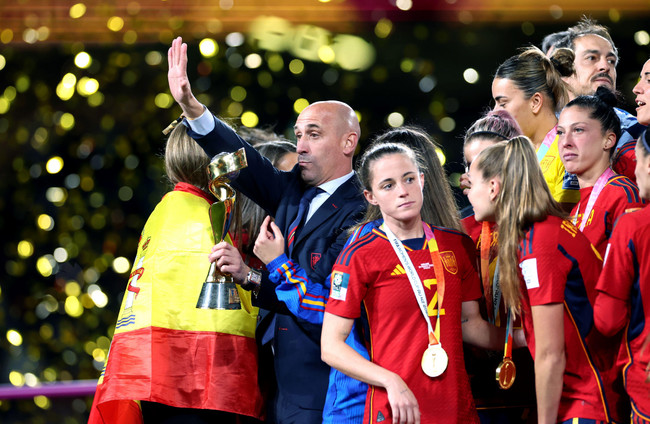IN SYDNEY LAST week, the latest in oleaginous oratory from the Right Reverend of Fifa’s white-trainered clergy, Gianni Infantino.
“I say to all the women, and you know I have four daughters, so I have a few at home, I say to all the women that you have the power to change”, he preached.
“Pick the right battles. Pick the right fights. You have the power to change. You have the power to convince us men what we have to do and what we don’t have to do. You do it. Just do it. With men, with Fifa, you will find open doors. Just push the doors. They are open.”
So mark it down as a epoch in the battle for progress – Fifa have evolved to the point they are now even willing to listen to women. The subtext to Infantino’s comments, of course, is that a woman won’t ever be in power in Fifa, but merely be in a position to persuade those in power.
As Norway’s Ada Hegerberg tweeted, “Working on a little presentation to convince men. Who’s in?”
But hey, it’s good news that the doors are open, because God knows what some men in football would be doing behind closed doors.
Spain’s World Cup triumph has been overshadowed by the grotesque carry-on of their federation president Luis Rubiales, who kissed Jenni Hermoso on the mouth in front of the world and then bridled against “idiots and stupid people” for making a big deal of it.
The political backlash in Spain led him to trot out the classic, I-am-sorry-to-those-who-took-offence apology the following day, saying it was meant without bad intentions and was a product of a moment of “absolute exultation.” If that is how Rubiales reacts in a moment of joy, then perhaps it’s time to ask the question: are some men simply too emotional to be involved in football?
Rubiales’ behaviour and Infantino’s comments overshadowed the end of the women’s World Cup, and for all that the competition will leave a legacy in inspiring girls to play the game, football remains a man’s game.
This was evident in the run-up to the tournament: of the 32 teams to have qualified, 15 have taken a stand against their own bosses across the last eight years to seek better conditions. The USA sued their own federation. Australia, Denmark, Argentina, Canada, South Africa all took strike action. Ireland, of course, threatened a strike in 2017. Hegerberg went into a principled exile of her own for five years. Colombia, Jamaica, and Nigeria all openly criticised their associations ahead of the competition. Players from New Zealand, France, and Spain demanded the resignation of their coach. (Of the three, only the Spanish federation did not agree to a change.) England, meanwhile, left for the World Cup amid a disagreement with the FA over bonuses. Mutiny was a condition of qualifying for the 2023 World Cup.
That England didn’t win the World Cup meant the folly of ‘Football’s coming home’ was not exposed. When the phrase is applied to England’s men’s team, it is little more than hubris; when it’s applied to the women’s team, it’s a lie. It would have meant the women’s World Cup coming ‘home’ to a country that banned women’s football until 1971, and to a country whose FA president didn’t even bother showing up to Sunday’s final.
The football the English authorities exported to the world was an exponent of muscular Christianity, a pseudo-military exercise to teach boys self-restraint, discipline and ultimately enforced gender norms. This legacy is still too prevalent across the game, and it won’t be change until there is change in the halls of power.
The day before Infantino delivered his latest sermon in Sydney, World Athletics voted to establish 50/50 gender balance on their decision-making council for the first time.
“I just know that if you have a gender-balanced organisation, you will have better thinking”, said president Seb Coe.
“In any academic of practical business examination, an organisation that is diverse and inclusive will be an organisation probably 15% better than one that isn’t. If we are going to attract more women, not just to the field of play, but to administrative roles, and young people, they need to look at our organisation and ask themselves a fundamental question, ‘Does this organisation reflect the world I live in?’ And if it doesn’t, they will find something else to do. I don’t want to be that organisation.”
Football’s governing bodies remain those organisations, and they will continue to disrespect the women’s game until there are more women involved in their administration. Seven members of Fifa’s 37-person council are women, while General-Secretary Fatma Samoura became the first woman to hold the role when she was appointed by Infantino in 2016.
The gender balance on Fifa’s Council does not reflect the wider reality: of Fifa’s 211 member associations, just 12 of them are led by female presidents.
The situation at Uefa is even worse, where there are as many women on their 20-member Executive Committee as there are men named Luis Rubiales. (Belgium, England, Iceland, and Norway are the only four of Uefa’s 55 members whose FA presidents are women.)
Roy Barrett of the FAI has recently shown genuine leadership on the issue, as he is stepping down at the end of this year to achieve a government-mandated 40% female representation on their board. The FAI will, however, fall short of achieving the same balance on their wider General Assembly panel by the end of the year.
The 2023 women’s World Cup was an undoubted success, but it reflected not just the progress made, but the fact it highlighted that there is much, much more work to be done.


